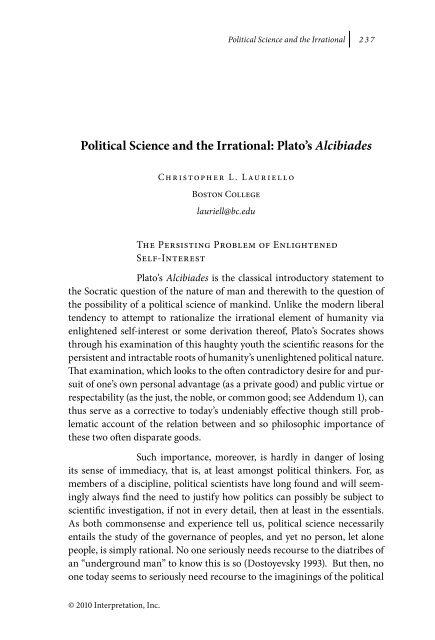Spring 2010 - Interpretation
Spring 2010 - Interpretation
Spring 2010 - Interpretation
You also want an ePaper? Increase the reach of your titles
YUMPU automatically turns print PDFs into web optimized ePapers that Google loves.
Political Science and the Irrational<br />
2 3 7<br />
Political Science and the Irrational: Plato’s Alcibiades<br />
C h r i s t oph e r L . L au r i e l l o<br />
Boston College<br />
lauriell@bc.edu<br />
The Persisting Problem of Enlightened<br />
Self-Interest<br />
Plato’s Alcibiades is the classical introductory statement to<br />
the Socratic question of the nature of man and therewith to the question of<br />
the possibility of a political science of mankind. Unlike the modern liberal<br />
tendency to attempt to rationalize the irrational element of humanity via<br />
enlightened self-interest or some derivation thereof, Plato’s Socrates shows<br />
through his examination of this haughty youth the scientific reasons for the<br />
persistent and intractable roots of humanity’s unenlightened political nature.<br />
That examination, which looks to the often contradictory desire for and pursuit<br />
of one’s own personal advantage (as a private good) and public virtue or<br />
respectability (as the just, the noble, or common good; see Addendum 1), can<br />
thus serve as a corrective to today’s undeniably effective though still problematic<br />
account of the relation between and so philosophic importance of<br />
these two often disparate goods.<br />
Such importance, moreover, is hardly in danger of losing<br />
its sense of immediacy, that is, at least amongst political thinkers. For, as<br />
members of a discipline, political scientists have long found and will seemingly<br />
always find the need to justify how politics can possibly be subject to<br />
scientific investigation, if not in every detail, then at least in the essentials.<br />
As both commonsense and experience tell us, political science necessarily<br />
entails the study of the governance of peoples, and yet no person, let alone<br />
people, is simply rational. No one seriously needs recourse to the diatribes of<br />
an “underground man” to know this is so (Dostoyevsky 1993). But then, no<br />
one today seems to seriously need recourse to the imaginings of the political<br />
© <strong>2010</strong> <strong>Interpretation</strong>, Inc.
















